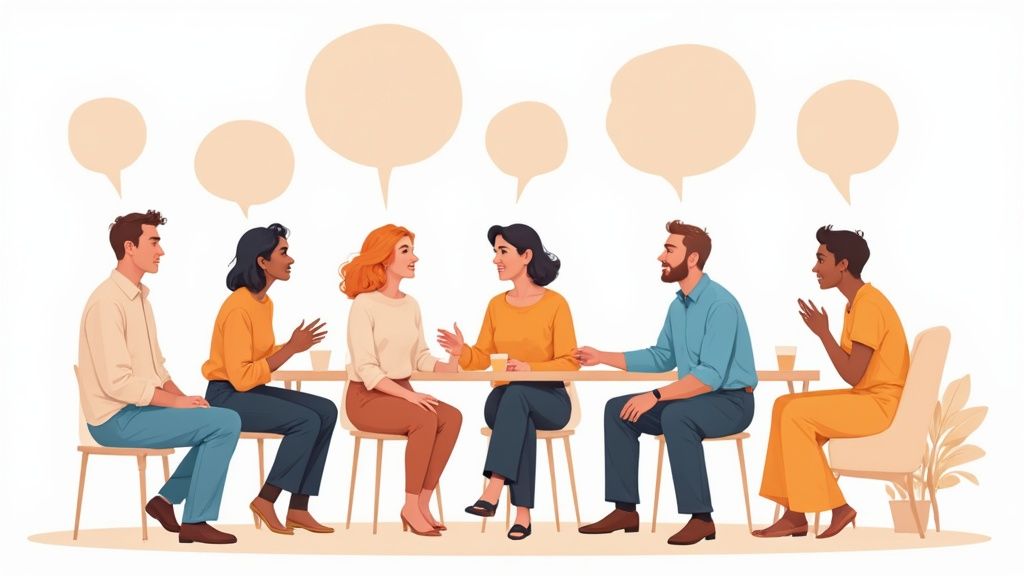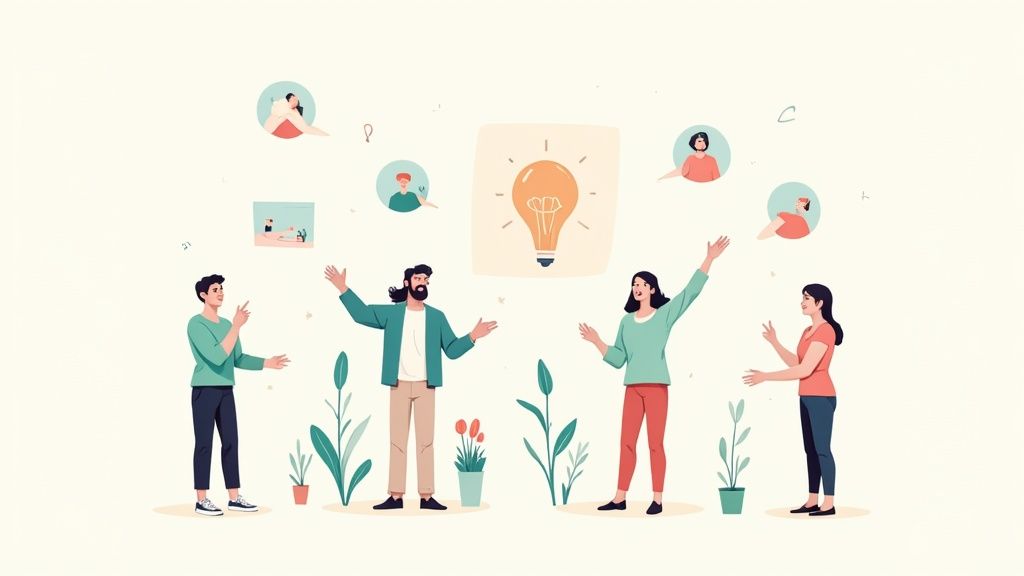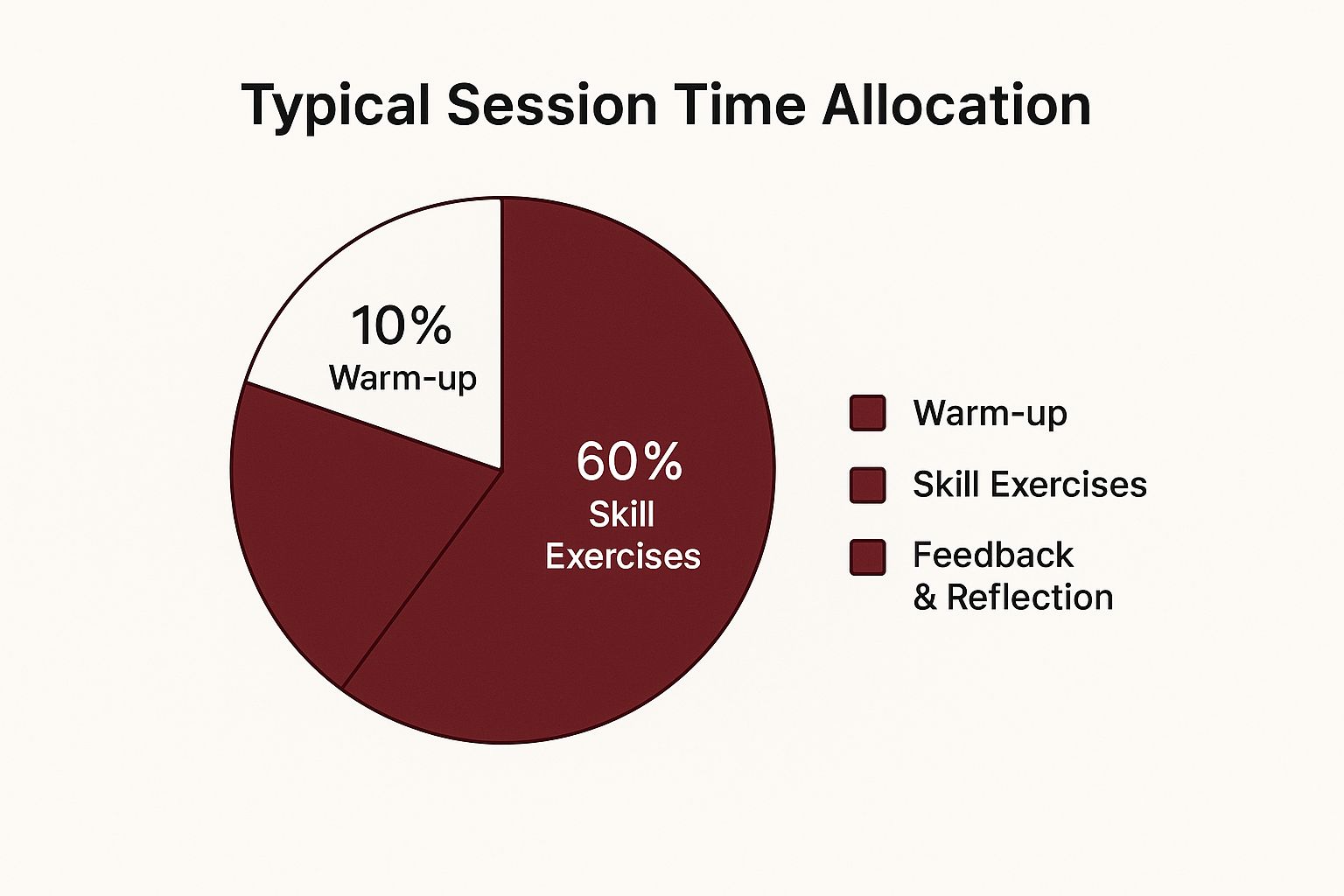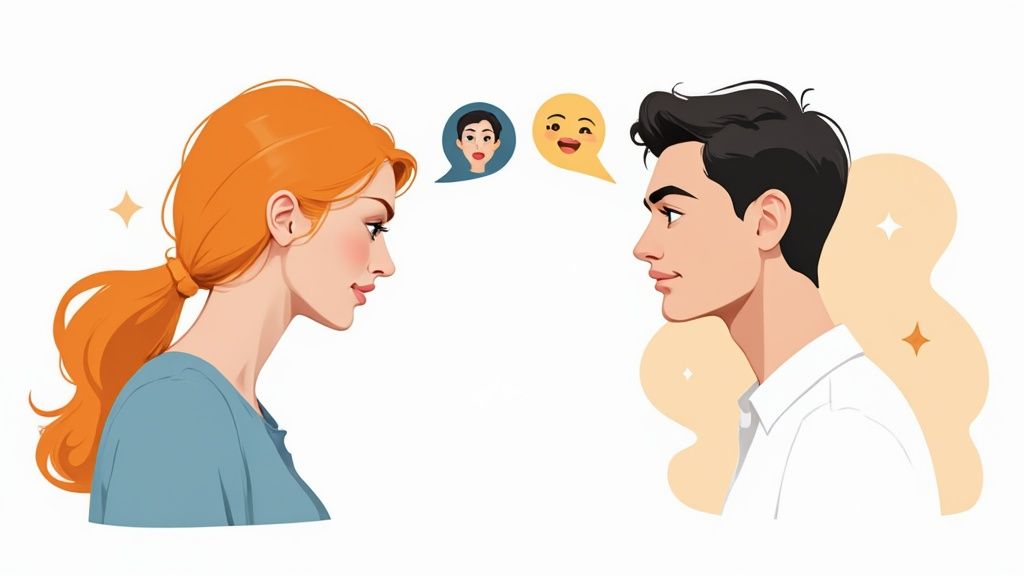Social skills groups for adults are structured, supportive places where you can learn and actually practice communication and interaction. The best way to think about it is like a social gym—a safe space to build confidence, learn to navigate social cues, and form real connections, all with a trained facilitator to guide you.
Understanding the Social Gym Concept

A lot of people hear "social skills groups for adults" and immediately assume they’re only for someone with a specific diagnosis, but that’s a pretty narrow view. These groups are for anyone who feels like their social interactions could be more effective, comfortable, or just plain rewarding.
Seeing it as a proactive step toward personal growth, rather than a fix for a problem, is key.
The "social gym" analogy really fits. You go to a physical gym to strengthen your muscles with specific exercises and guidance from a trainer, right? A social skills group gives you a dedicated space to build up your communication muscles in the same way. You wouldn't be expected to deadlift 300 pounds on your first day, and you shouldn't be expected to effortlessly navigate a complex networking event without practicing the foundational skills first.
What Do These Groups Focus On?
These groups work by breaking down complex social situations into smaller, more manageable parts. The whole point is to demystify the social rules that often feel unwritten or seem intuitive to everyone else. This structured approach helps you build a solid foundation, which eventually allows for more spontaneous and authentic connections.
A social skills group isn’t about changing who you are. It’s about giving you the tools to express yourself more effectively and build the connections you want, on your own terms.
Common areas of focus usually include things like:
- Initiating and Maintaining Conversations: Learning how to kick off a chat with someone new and keep it going beyond just the weather.
- Reading Social Cues: Getting a better handle on body language, facial expressions, and tone of voice to understand what's really going on in a conversation.
- Active Listening: Developing the skill of listening with your full attention, which helps others feel truly heard and understood.
- Navigating Disagreements: Practicing how to express a different opinion respectfully without shutting the conversation down.
A Safe Space for Practice
What makes these groups so effective is that they provide a judgment-free zone. Mistakes aren't just allowed; they’re actually seen as learning opportunities.
This supportive environment is what gives people the confidence to step outside their comfort zones, try new approaches, and get constructive feedback without the intense fear of social rejection. The ultimate goal is to take the skills you practice in the group and apply them to your real life—from workplace meetings to casual get-togethers—making your social world a more fulfilling place to be.
Who Truly Benefits from Joining a Social Skills Group
It’s easy to have a specific “type” of person in mind when you hear about social skills groups, but the reality is much broader. The common thread isn't a diagnosis, but a shared desire to connect with others more easily and meaningfully.
Think about a talented professional who is a rockstar at their job but clams up at networking events. They might struggle to make small talk, feeling like an invisible social wall is holding back their career. For them, a social skills group offers practical tools to start conversations and build professional relationships with confidence.
Or what about someone dealing with social anxiety? They might turn down invitations or feel a knot in their stomach in group settings, constantly worried they’ll say the wrong thing. These groups provide a safe, structured space to practice interacting, which helps slowly chip away at that fear and build the confidence to actually enjoy social events.
Adults on the Autism Spectrum
For many autistic adults, social skills groups for adults can be a game-changer for building real friendships. The unwritten social rules that seem second nature to others can feel abstract and confusing.
These groups break things down, offering concrete strategies for reading social cues, keeping conversations balanced, and understanding the nuances of friendship. It’s all about learning actionable skills in a supportive environment, which can translate directly into a richer, more fulfilling social life.
The goal isn’t to change who someone is. It’s about giving them a clearer “social map” so they can navigate interactions with more confidence and less stress.
A Broader, Inclusive Audience
Beyond these examples, lots of other people find these programs incredibly helpful. This could be someone feeling isolated after a big life change, a person who finds it hard to maintain long-term friendships, or anyone who just feels like their social “muscles” are a little out of shape.
Research backs this up time and again. One study found that adult social skills training led to major improvements in social competence for participants with a variety of different psychiatric diagnoses, showing just how effective it can be. You can read the full study on social competence improvements here.
At the end of the day, anyone who’s ever wished for a playbook on social interactions can benefit. The unifying factor is a proactive desire to grow—to feel more connected, understood, and at ease around others.
The Core Benefits of Adult Social Skills Groups
Jumping into a social skills group for adults isn't just about learning how to make small talk. The benefits create a positive ripple effect that touches everything from your personal relationships and career to your overall mental well-being. It’s about building a foundation of confidence that supports you in every corner of your life.
One of the first things people notice is a real boost in self-confidence. When you get to practice new social tools in a safe, supportive space and see them actually work, your belief in your own abilities just naturally grows. This isn’t about faking it; it’s about building genuine social competence.
This newfound confidence is a game-changer for reducing social anxiety. Think of anxiety as a blaring alarm that goes off in social situations. A skills group gives you the tools to understand what triggers that alarm and, more importantly, how to turn down the volume, making it so much easier to connect with people.
From Practice to Real-World Application
The whole point is to take what you learn in the group and use it in your everyday life. You move from structured role-playing exercises to having spontaneous, authentic conversations out in the wild.
- Improved Conversational Skills: You’ll learn the nuts and bolts of starting, maintaining, and gracefully ending a conversation. No more awkward silences or feeling stuck talking to someone because you don't know how to leave.
- Stronger Relationships: By sharpening skills like active listening, empathy, and even navigating disagreements, you can build deeper, more meaningful connections with friends, family, and partners.
- Enhanced Career Prospects: Better social skills are a huge asset at work. They improve your ability to network, collaborate with your team, and communicate clearly with managers. Our guide on how social skills groups can open new doors explores this connection in more detail.
The core idea is that social interaction is a skill, not an innate talent. Like any skill, it can be learned, practiced, and mastered with the right guidance and environment.
Reducing Anxiety and Building Resilience
A huge benefit of these groups is the structured way they help you manage social fears. By gradually facing different social scenarios in a controlled environment, you build resilience. It’s a bit like exposure therapy, but you’re in a community where everyone is working toward similar goals.
This process has a powerful impact on mental well-being. Research on group social skills programs shows they are effective at improving cooperation, empathy, and self-control. Interestingly, by fostering cognitive flexibility and emotional regulation, these programs also help reduce anxiety-related repetitive behaviors, even without directly targeting them.
Ultimately, joining a social skills group is an investment in yourself. It gives you the tools not just to navigate the social world, but to truly thrive in it and build a more connected, fulfilling life.
What to Expect Inside a Typical Group Session
Walking into a social skills group for the first time can feel a little intimidating. What actually happens in there? The good news is that these sessions are designed to be welcoming and predictable, more like an interactive workshop than a stuffy classroom lecture.
Most groups follow a consistent rhythm from week to week. This structure isn't just for show—it helps lower anxiety and allows everyone to relax and focus on what they're there to do: learn and practice. A trained facilitator is there to guide the process and, most importantly, create a safe, non-judgmental space for everyone to grow.
The Flow of a Standard Session
A typical meeting kicks off with a brief, informal check-in. This is simply a chance for everyone to arrive, settle in, share a quick update about their week, and get into the group mindset. It’s a great way to build a sense of community right from the start.
After the check-in, the facilitator introduces the skill of the day. This could be anything from decoding body language and using humor appropriately to navigating disagreements without burning bridges. The concept is always broken down in a clear, practical way that connects directly to real-world situations.
Practice and Feedback: The Heart of the Experience
Now for the most important part: practice. This is where you get to put the theory into action, usually through role-playing and other structured activities. If the topic is active listening, for example, you might pair up with another member to practice a conversation where your only job is to listen and reflect back what you heard.
The goal isn't perfection. It's about trying out new behaviors in a low-stakes environment where it's okay to feel awkward or make mistakes. This hands-on application is what builds real, lasting confidence. The image below gives you a sense of how a session’s time is usually spent.
As you can see, the bulk of the time is dedicated to skill-building exercises. This ensures every session is focused on doing, not just listening.
To wrap things up, the group comes together for feedback and discussion. Members can share what they learned, what felt tricky, and what they want to try practicing during the week. The facilitator makes sure all feedback is constructive and supportive. This reflection is crucial for making the lessons stick.
For those looking for a program with this kind of hands-on approach, exploring a social skills group in Manhattan can be a great next step. The goal is to leave each session feeling more prepared to apply these skills in your daily life.
Finding the Right Type of Social Skills Program
Just like there are different coaching styles for athletes, social skills groups for adults come in all shapes and sizes. Each one has its own unique approach, and the "right" one really comes down to your personal goals, how you learn best, and what you’re hoping to get out of the experience.
Think of it like picking an exercise class. If you want a fast-paced, structured workout, a high-intensity interval training (HIIT) class is perfect. But if you’re looking for flexibility and mindfulness, you’d probably go for yoga. One isn’t better than the other; they just serve different needs. Social skills programs are the same way.
Structured and Evidence-Based Curricula
For anyone who thrives with clear rules and concrete, step-by-step instructions, an evidence-based program is a great place to start. These are built on solid research and have a proven track record for helping people achieve specific social goals.
One of the most well-known is PEERS® (Program for the Education and Enrichment of Relational Skills). Originally developed back in 2004, the adult version of PEERS® offers explicit, rule-based strategies for making and keeping friends. Research has consistently shown it works, improving social skills and engagement for adults with autism both in person and online. You can learn more about the impact of PEERS® and similar programs on Autism.org.
Therapy-Based and Flexible Group Models
Other groups are built around established therapeutic methods. This is where you'll find programs that lean on approaches like Cognitive Behavioral Therapy (CBT) to guide the sessions.
A CBT-based group doesn't just teach you what to do in a social situation; it helps you understand and reframe the anxious thoughts that might be holding you back in the first place.
These groups are a fantastic fit if your social difficulties are tied to anxiety. They tackle the root thought patterns that create fear and avoidance, helping you build both practical skills and emotional resilience.
Finally, some groups are more like topic-driven support circles. They’re less structured and give members a space to share experiences, get peer support, and tackle a range of social challenges together. These groups foster a strong sense of community and are perfect for practicing skills in a more natural, conversational way. Getting to know these different models is the first step toward finding a program that truly feels right for you.
How to Find and Choose the Right Group for You
Okay, so you have a good handle on the different types of programs out there. Now comes the important part: finding the one that’s the perfect fit for you. Think of choosing a social skills group for adults like picking a great personal trainer—you need the right expertise, a style that meshes with yours, and an environment where you feel supported, not judged.
Starting the search can feel a bit daunting, but there are a few tried-and-true places to begin. Your primary care doctor or therapist is a great first stop; they often have a network of trusted local practitioners they can refer you to. University psychology departments and campus mental health centers are another excellent resource, as many run their own groups or keep updated lists of community-based programs.
You can also turn to reputable online directories. Websites from organizations like the Anxiety & Depression Association of America (ADAA) or Psychology Today are fantastic because they let you filter providers by specialty and location, saving you a ton of time.
Key Questions to Ask Before Joining
Once you’ve got a shortlist, it's time to do a little digging. Any good provider will be more than happy to schedule a quick consultation call and answer your questions. This is your chance to interview them and get a real feel for the group.
Think of this consultation as a two-way interview. You're not just being assessed; you're figuring out if their program truly aligns with your goals and comfort level.
To get the most out of that conversation, here are a few essential questions to ask:
- Facilitator Credentials: "What kind of training and experience do you have in leading adult social skills groups?" You'll want to look for licensed professionals, like psychologists, social workers, or counselors.
- Group Structure: "What curriculum or model do you follow?" Knowing if they use PEERS®, CBT, or another established approach gives you a clear idea of what to expect from the sessions.
- Group Demographics: "What is the typical size and makeup of the group?" This helps you find a dynamic where you’ll feel most at ease. For example, some programs are specifically designed to build social skills for autistic adults, which you can learn more about in our dedicated guide.
- Logistics and Cost: "What is the cost, duration of the program, and what is your attendance policy?"
Taking the time to ask these questions upfront is incredibly empowering. It helps you make an informed choice, ensuring you invest your time and energy in a group that will genuinely help you thrive.
Answering Your Questions About Social Skills Groups
It's completely normal to have questions before trying something new. When you're considering a social skills group, knowing the practical details can make the decision feel much easier and less intimidating.
What's the Cost?
This is usually the first question on everyone's mind. The cost of a social skills group can vary quite a bit, depending on things like the facilitator’s experience, how long the program runs, and even your location. Some groups might take insurance, but many are private pay. It’s always a good idea to ask for the specific costs upfront so there are no surprises.
What's the Time Commitment?
Another big question is how much time you'll need to set aside. Most groups meet once a week for about 60 to 90 minutes. A typical program usually runs for a set period, often between 8 and 12 weeks. This gives everyone enough time to really learn, practice, and start to feel comfortable with new skills.
What if I'm Too Nervous to Join?
Feeling nervous about joining is not just normal—it's expected. In fact, these groups are specifically designed to be safe, supportive spaces where everyone is learning together. You won’t be the only one feeling a little anxious.
The facilitator's job is to create a non-judgmental space, ensuring everyone feels comfortable participating at their own pace. You won't be pushed into anything you're not ready for.
Think of it as a low-pressure practice field. It’s a place where you can try out new ways of interacting without the fear of real-world social rejection, helping you build confidence one step at a time.
At the Sachs Center, we specialize in providing compassionate, expert-led support for neurodivergent adults. If you're looking for diagnostic clarity or therapeutic services tailored to you, explore our offerings at https://sachscenter.com.


